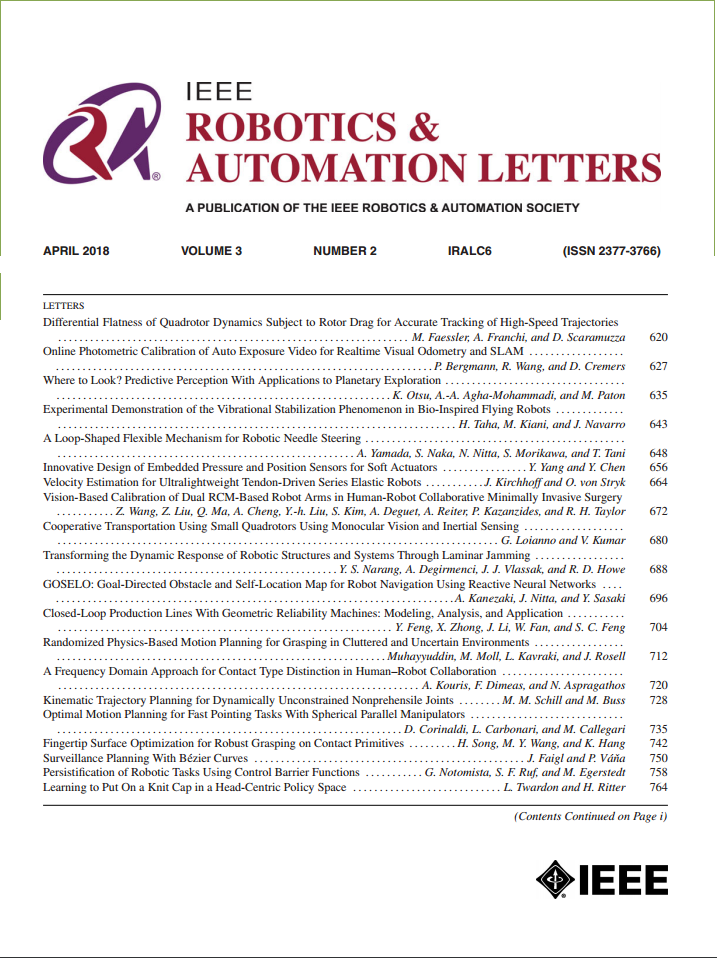Semantic Exploration and Dense Mapping of Complex Environments Using Ground Robot With Panoramic LiDAR-Camera Fusion
IF 5.3
2区 计算机科学
Q2 ROBOTICS
引用次数: 0
Abstract
This paper presents a system for autonomous semantic exploration and dense semantic target mapping of a complex unknown environment using a ground robot equipped with a panoramic LiDAR-camera system. Existing approaches often struggle to strike a balance between collecting enough high-quality observations from multiple view angles and avoiding unnecessary repetitive traversal. To fill this gap, we propose a complete system that combines mapping and planning. We first redefine the task as completing both geometric coverage and semantic viewpoint observation. Subsequently, we manage semantic and geometric viewpoints separately and propose a novel Priority-driven Decoupled Local Sampler to generate local viewpoint sets. This allows for explicit multi-view semantic inspection and voxel coverage without unnecessary repetition. Building on this, we develop a hierarchical planner that ensures efficient global coverage. In addition, we propose a Safe Aggressive Exploration State Machine, which allows the robot to extend its exploration path planning into unknown areas while ensuring the robot's safety with recovery behavior and adaptive sampling. Our system includes a modular semantic target mapping component designed to utilize odometry and point clouds from existing SLAM algorithms, enabling point-cloud-level dense semantic target mapping. We validate our approach through extensive experiments in both realistic simulations and complex real-world environments. Simulation results demonstrate that our planner achieves faster exploration and shorter travel distances while guaranteeing a specified number of multi-view inspections. Real-world experiments further confirm the effectiveness of the system in achieving accurate dense semantic object mapping of unstructured environments.基于全景LiDAR-Camera融合的地面机器人复杂环境的语义探索和密集映射
本文提出了一种基于地面机器人的复杂未知环境自主语义探测和密集语义目标映射系统,该系统配备了全景激光雷达相机系统。现有的方法往往难以在从多个视角收集足够高质量的观察结果和避免不必要的重复遍历之间取得平衡。为了填补这一空白,我们提出了一个结合测绘和规划的完整系统。我们首先将任务重新定义为完成几何覆盖和语义视点观察。随后,我们分别管理语义视点和几何视点,并提出了一种新的优先级驱动的解耦局部采样器来生成局部视点集。这允许明确的多视图语义检查和体素覆盖,而没有不必要的重复。在此基础上,我们开发了一个分层规划,以确保有效的全球覆盖。此外,我们提出了一种安全主动探索状态机,该状态机允许机器人将其探索路径规划扩展到未知区域,同时通过恢复行为和自适应采样确保机器人的安全性。我们的系统包括一个模块化语义目标映射组件,旨在利用现有SLAM算法中的里程计和点云,实现点云级密集语义目标映射。我们通过在现实模拟和复杂的现实环境中进行大量实验来验证我们的方法。仿真结果表明,该规划器在保证指定的多视点检查次数的同时,实现了更快的探测速度和更短的行驶距离。现实世界的实验进一步证实了该系统在实现非结构化环境的精确密集语义对象映射方面的有效性。
本文章由计算机程序翻译,如有差异,请以英文原文为准。
求助全文
约1分钟内获得全文
求助全文
来源期刊

IEEE Robotics and Automation Letters
Computer Science-Computer Science Applications
CiteScore
9.60
自引率
15.40%
发文量
1428
期刊介绍:
The scope of this journal is to publish peer-reviewed articles that provide a timely and concise account of innovative research ideas and application results, reporting significant theoretical findings and application case studies in areas of robotics and automation.
 求助内容:
求助内容: 应助结果提醒方式:
应助结果提醒方式:


